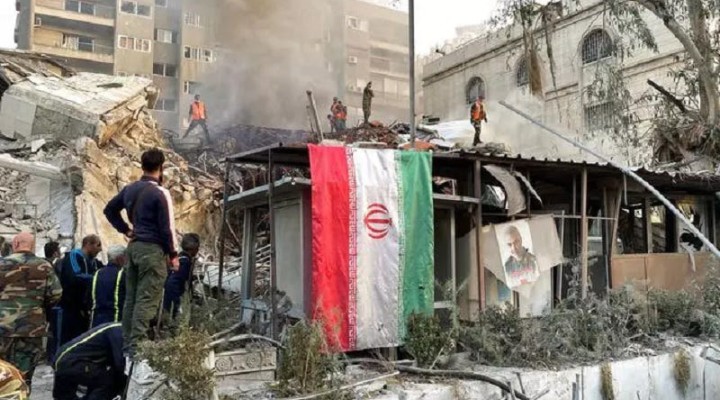Israel’s Bombing Of The Iranian Consulate In Damascus Was A Strategic Mistake

Israel no longer controls the escalation ladder since its audacious attack pressures Iran to at least symmetrically respond with its own attack against an Israeli consulate somewhere. Depending on whether this happens and how severe of an attack it is, Israel might then feel pressured to escalate in response, thus catalyzing an uncontrollable cycle that could spiral into the worst-case scenario.
Israel bombed the Iranian consulate in Damascus on Monday in an audacious attack that killed several high-profile IRGC targets. Iran vowed to avenge their deaths at a time and place of its choosing, which it’s pressured to do in some way or another after this flagrant violation of international law. Foreign diplomatic facilities are protected under the Vienna Convention, and Israel knows this very well after prior Iranian-linked attacks against its own such facilities, yet it still carried out this attack anyhow.
That was arguably a strategic mistake and perhaps one of the highest order since Israel is militarily defeating Hamas in Gaza, though at the expense of the civilian population there, which has been collectively punished through ethnic cleansing, famine, and genocide. These humanitarian and reputational costs were deemed worth it by Bibi for the sake of security, yet now he might have actually worsened his country’s security precisely at the time when he’s on the verge of declaring victory in Gaza.
The Houthis’ opening of a second front was insufficient for stopping Israel’s campaign while Hezbollah has thus far remained reluctant to open up a third one that would risk “mutually assured destruction”. Neighboring Jordan has recently experienced an upsurge of Hamas-inspired and Muslim Brotherhood-driven unrest, but it’ll likely remain manageable due to the security forces’ years of Western training, thus meaning that another front probably won’t open up on its own in that kingdom either.
Without Hezbollah waging total war against Israel and/or Jordan slipping into a Libyan-like conflict that spills over into the West Bank, Israel will complete its destruction of Hamas in Gaza. Such was the state of affairs up until Monday’s audacious attack, however, because now Iran feels pressured to escalate in ways that could risk opening up another front. This could happen for example if it requests Hezbollah to respond in a way that inadvertently prompts an Israeli overreaction which then leads to all-out war.
Another possibility is that the IRGC, Hezbollah, and/or allied Iraqi militants set their Hybrid War sights on Jordan with a view of triggering its collapse in order to provoke an immediate national security crisis on Israel’s eastern borders that could draw the bulk of its forces away from Gaza in an instant. Regardless of what many Alt-Media commentators have claimed over the past six months, Israel doesn’t want to risk “mutually assured destruction” by waging war against Hezbollah and/or Iran.
If there was any appetite for doing so, then it could have launched overwhelming first strikes against them to decapitate their leadership and destroy as many of their offensive weapons as possible before bracing for the retaliation that would follow. The time for doing so has long passed though since the most opportune moment would have been right after Hamas’ sneak attack on 7 October, not half a year later when its opponents have now prepared for that possibility even more than they already were.
Israel no longer controls the escalation ladder, however, since its audacious attack pressures Iran to at least symmetrically respond with its own attack against an Israeli consulate somewhere. Depending on whether this happens and how severe of an attack it is, Israel might then feel pressured to escalate in response, thus catalyzing an uncontrollable cycle that could spiral into the worst-case scenario. In that event, an overwhelming first strike by either side becomes much more likely than before.
This comes at the worst possible time for Israel as it’s wrapping up its campaign against Hamas and preparing for Gaza’s post-conflict future that Axios reported might involve a multinational Arab military force taking responsibility for law enforcement and humanitarian activities. That would be unlikely to occur amidst a major escalation between Israel and its Resistance Axis foes, which could lead to its aforesaid campaign dragging on even longer with growing physical, financial, and reputational costs.
Had Israel not bombed the Iranian consulate in Damascus, then it wouldn’t have to worry about anything coming up to offset its impending military victory, which to remind the reader entailed enormous humanitarian and other costs that Bibi deemed worth it in the name of security. Its plans are now much more uncertain than ever since nobody knows if, when, or how Iran might respond to this audacious attack, but should retribution come sooner than later, then it could truly be a game-changer.
https://korybko.substack.com/p/israels-bombing-of-the-iranian-consulate
 TheAltWorld
TheAltWorld 
15 thoughts on “Israel’s Bombing Of The Iranian Consulate In Damascus Was A Strategic Mistake”